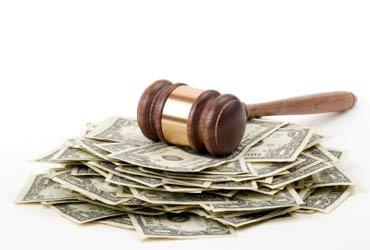INSTITUTE INDEX: The Big Money threat to our courts

U.S. voters are concerned that the large sums of money flowing into judicial elections are affecting judges' rulings.
Date on which the U.S. Supreme Court upheld Florida's ban on judges personally soliciting campaign money, stating in the majority opinion that such requests cause "diminishing public confidence in judicial integrity": 4/29/15
Of the 39 states that hold elections for judges, number that place some restrictions on judicial candidates personally soliciting campaign donations: 30
Of the nine states without any such restrictions, number that are in the South: 4*
Percent of eligible candidates who used North Carolina’s first-in-the-nation public judicial financing program, which was implemented in 2004 and allowed candidates to receive a public campaign grant in exchange for accepting strict spending and fundraising limits: 80
Year in which North Carolina’s Republican-controlled legislature ended the judicial public financing program: 2013
Amount raised by candidates who ran last year for four seats on the N.C. Supreme Court, the first such election without judicial public financing in more than a decade: at least $3.8 million
Percent by which that fundraising total broke the previous record set in 2000, adjusted for inflation: 31
Amount the Republican State Leadership Committee, a group that spearheaded GOP-friendly redistricting efforts in the states, contributed to a North Carolina outside group that in turn used it to buy ads supporting the election of N.C. Supreme Court Justice Paul Newby in 2012: more than $1 million
Month in which voting rights advocates asked the N.C. Supreme Court to require Newby to recuse himself from a case challenging the state's redistricting, arguing that the RSLC money spent on his behalf undermines public perception of his impartiality: 11/2012
Month in which the Republican-dominated N.C. Supreme Court denied the groups' recusal request without opinion or explanation: 12/2012
Year in which the groups again requested Newby's recusal and again were ignored: 2013
Year in which two former N.C. Supreme Court justices signed on to a friend-of-the-court brief in a West Virginia case titled Caperton v. Massey, arguing that a judge should recuse himself from a case "not only when the judge consciously perceives the judge's own partiality, but also when there exists a reasonable appearance of partiality or impropriety": 2009
In the case at the heart of Caperton, damages a West Virginia jury awarded in 2002 to the president of a mining company driven out of business after its contract was fraudulently canceled by Massey Coal: $50 million
After the Caperton verdict but before the appeal to the West Virginia Supreme Court, amount Massey CEO Don Blankenship spent to create an outside spending group that sought to replace an incumbent justice with attorney Brent Benjamin, who went on to win: $3 million
The West Virginia Supreme Court's vote on appeal to overturn the verdict against Massey, with Benjamin — who refused the plaintiff's request to recuse himself — joining with the majority: 3-2
While lining up thousands of dollars in campaign contributions for West Virginia Supreme Court Chief Justice Robin Jean Davis, amount a lawyer offered the justice's husband for his Lear Jet as a $90 million nursing home abuse verdict the lawyer was appealing made its way through the state courts: $1.3 million
Percent by which Chief Justice Davis lowered the final payout: 55
Amount Maryland attorney Michael Peroutka, a neo-Confederate who has said there is “no such thing as a civil right,” and his law firm have contributed to Alabama Supreme Court Chief Justice Roy Moore: $180,000
Rank of Moore among the biggest beneficiaries of political contributions from Peroutka: 1
Date on which Moore likened the U.S. Supreme Court's recent marriage equality ruling to its 1857 Dred Scott decision that held African Americans could not be citizens while comparing same-sex marriage to the murder of Jews by Nazis: 6/29/2015
Amount that outside groups, many of which are not required to disclose their donors, spent on TV ads to influence state Supreme Court races last year alone: $4.9 million
If the number of TV ads for state supreme court candidates doubles in a given state, percent increase in the likelihood a justice in that state will vote against a criminal defendant's appeal: 8
In a poll commissioned by the Brennan Center and Justice at Stake, percent of U.S. voters who said they think fundraising and money in judicial elections affect judges' rulings: 90
* The Southern states without restrictions on judicial campaign solicitations are Alabama, Georgia, North Carolina and Texas; the others are California, Kansas, Maryland, Montana and Nevada. The 11 states that don't elect judges include just two in the South: Virginia and South Carolina.
(Click on figure to go to source.)
Tags
Sue Sturgis
Sue is the former editorial director of Facing South and the Institute for Southern Studies.
